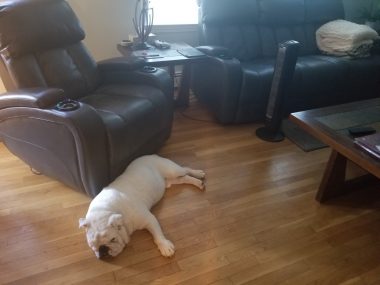Poor Treatment Access, Tropical Climate Make Life Hard for Cuban NMO Patients
Written by |

My heart goes out today to the neuromyelitis optica (NMO) patients in Cuba for two reasons. Firstly, it is difficult for them to access treatment right now. Secondly, the island is experiencing tropical weather. Neither factor is helpful for NMO patients.

Mileidys wonders if we are in the end times. (Courtesy of Mileidys Almaguer Iniguez)
The first factor, difficulty accessing treatment, can have devastating effects for NMO patients. NMO is a progressive, degenerative disease with no cure. Without treatment, an NMO patient can quickly deteriorate, resulting in severe disability or death. Medical supplies and medications are currently severely limited in Cuba. If these are difficult to access for common diseases, they must be even harder to acquire for rare diseases.
New COVID-19 variants have collapsed Cuba’s health system, though it was not at its best before the pandemic, either. However, most doctors and medical personnel are doing their best with what they have.
The second factor, the tropical climate, also affects NMO patients, because heat can worsen symptoms. When I was diagnosed with NMO, I lived in Florida, which has a tropical climate like Cuba. But in Florida, most homes have air conditioning. For those who can’t afford it, fans are widely available for purchase. In Cuba, most homes don’t have AC, which makes it harder to manage NMO symptoms.
During my last year in Florida, my car’s air conditioning didn’t work. By the time I left the office at 5 p.m., my car felt like an oven. The commute took 40 minutes, so by the time I arrived home, I felt like my body was boiling. To cool down, I would lie on the cold tile floor. I was so grateful that my house had air conditioning.
When my husband and I were house shopping after moving to Massachusetts, I realized that many of the houses didn’t have central AC. While the summers in Massachusetts aren’t very long, when it gets hot here, it gets hot.
When a heat wave recently hit the state, we had an issue with our air conditioning. We called the AC company on a Friday, and a technician came to our house. He told us he needed to order a part that would arrive Monday. He said he understood the urgency of fixing it, because his mother has multiple sclerosis, and he knows how bad the heat is for her symptoms.
That day and the next were awful. Thankfully, we have fans in the house, but they were circulating hot air. Because of the unbearable heat, the first symptom I felt was the sensation of electricity in the right side of my head. It also affected my right ear. Then, I felt like someone was stabbing my right eye.
Next, I felt tired, so I lay down on the floor with my English bulldog, Tito, who doesn’t do well in the heat, either. He panted until he fell asleep and started to loudly snore, like always.

Mileidys’ dog, Tito, lies in front of his fan while struggling with an August heat wave in Massachusetts. (Photo by Mileidys Almaguer Iniguez)
His loud snoring didn’t stop me from falling asleep. That’s how tired I was. If someone can sleep next to Tito, they must be exhausted. For other English bulldog owners reading this column, you know how loudly they can snore.
To end on a positive note, I hope and pray that someday, regardless of nation or climate, everyone can receive the treatment they need. For now, I am blessed to have proper treatment for my rare disease and a cool climate suitable for managing my symptoms. I am even more blessed to live in the U.S., a country that has given me so much. And medical attention is only a small part of that.
***
Note: Neuromyelitis News is strictly a news and information website about the disease. It does not provide medical advice, diagnosis, or treatment. This content is not intended to be a substitute for professional medical advice, diagnosis, or treatment. Always seek the advice of your physician or other qualified health provider with any questions you may have regarding a medical condition. Never disregard professional medical advice or delay in seeking it because of something you have read on this website. The opinions expressed in this column are not those of Neuromyelitis News or its parent company, Bionews, and are intended to spark discussion about issues pertaining to neuromyelitis optica spectrum disorder.







Leave a comment
Fill in the required fields to post. Your email address will not be published.